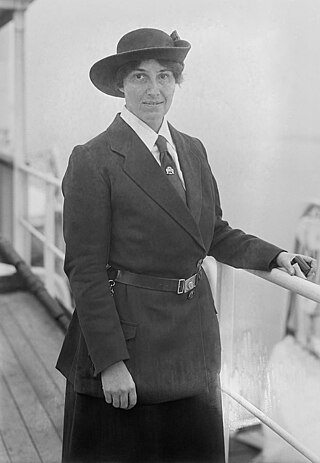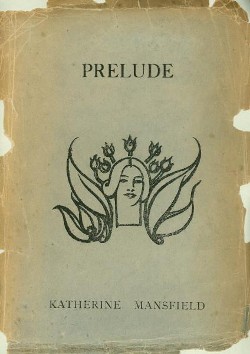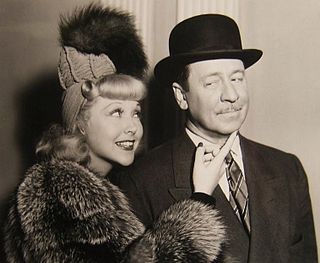
Kathleen Mansfield Murry was a New Zealand writer and critic who was an important figure in the modernist movement. Her works are celebrated across the world and have been published in 25 languages.

A governess is a woman employed as a private tutor, who teaches and trains a child or children in their home. A governess often lives in the same residence as the children she is teaching. In contrast to a nanny, the primary role of a governess is teaching, rather than meeting the physical needs of children; hence a governess is usually in charge of school-aged children, rather than babies.

Olave St Clair Baden-Powell, Baroness Baden-Powell was the first Chief Guide for Britain and the wife of Robert Baden-Powell, 1st Baron Baden-Powell. She outlived her husband, who was 32 years her senior, by over 35 years.

Street Scene is an American opera by Kurt Weill (music), Langston Hughes (lyrics), and Elmer Rice (book). Written in 1946 and premiered in Philadelphia that year, Street Scene is based on the Pulitzer Prize-winning 1929 play of the same name by Rice.

Dus Kahaniyaan is a 2007 Indian Hindi-language anthology film which tell ten different stories which are directed by a host of six directors: Sanjay Gupta, Apoorva Lakhia, Meghna Gulzar, Rohit Roy, Hansal Mehta and Jasmeet Dhodhi.
"Feuille d'Album" is a 1917 short story by Katherine Mansfield. It was first published in the New Age on 20 September 1917, under the title of An Album Leaf. A revised version later appeared in Bliss and Other Stories.
"A Dill Pickle" is a 1917 short story by Katherine Mansfield. It was first published in the New Age on 4 October 1917. A revised version later appeared in Bliss and Other Stories. The characters and their relationship possibly were inspired by Mansfield's older sister Vera Margaret Beauchamp and her husband James Mackintosh Bell.
"Je ne parle pas français" is a short story by Katherine Mansfield. She began it at the end of January 1918, and finished it by February 10. It was first published by the Heron Press in early 1920, and an excised version was published in Bliss and Other Stories later that year.
"Millie" is a 1913 short story in the Modernist, stream-of-consciousness style by Katherine Mansfield. It was first published in The Blue Review in June 1913, and was one of the first stories published by Mansfield; it was reprinted in her 2024 collection Something Childish and Other Stories.
"How Pearl Button Was Kidnapped" is a 1912 short story by Katherine Mansfield. It was first published in Rhythm in September 1912 under the pen name of Lili Heron. It was republished in Something Childish and Other Stories (1924).
"The Man Without a Temperament" is a 1920 short story by Katherine Mansfield. It was first published in Arts and Letters in Spring 1920, and later reprinted in Bliss and Other Stories.
"The Daughters of the Late Colonel" is a 1920 short story by Katherine Mansfield. It was first published in the London Mercury in May 1921, and later reprinted in The Garden Party and Other Stories.

"Prelude" is a short story by Katherine Mansfield. It was first published by the Hogarth Press in July 1918, after Virginia Woolf encouraged her to finish the story. Mansfield had begun writing "Prelude" in the midst of a love affair she had in Paris in 1915. It was reprinted in Bliss and Other Stories (1920). The story was a compressed and subtler version of a longer work The Aloe, which was later published posthumously in full.
"Pictures" is a 1917 short story by Katherine Mansfield. It was first published under the title of The Common Round in the New Age on 31 May 1917 and later as The Pictures in Art and Letters in Autumn 1919. It was then reprinted as Pictures in Bliss and Other Stories.
"Marriage à la Mode" is a 1921 short story by Katherine Mansfield. It was first published in The Sphere on 31 December 1921, and later reprinted in The Garden Party and Other Stories.
"An Indiscreet Journey" is a 1915 short story by Katherine Mansfield.
"Something Childish But Very Natural" is a short story written by Katherine Mansfield in 1914. It was first published posthumously in the Adelphi. It was republished in Something Childish and Other Stories (1924).
"The Wind Blows" is a short story by Katherine Mansfield. It was first published in the magazine Signature as “Autumns: II” under the pseudonym Matilda Berry. It was published in revised form in the Athenaeum on 27 August 1920, and subsequently reprinted in Bliss and Other Stories.

Bedtime Story is a 1941 American comedy film directed by Alexander Hall and starring Fredric March, Loretta Young, and Robert Benchley. The supporting cast includes Eve Arden and Joyce Compton.
Sugarbaby is a 1985 West German film directed by Percy Adlon and starring Marianne Sägebrecht.